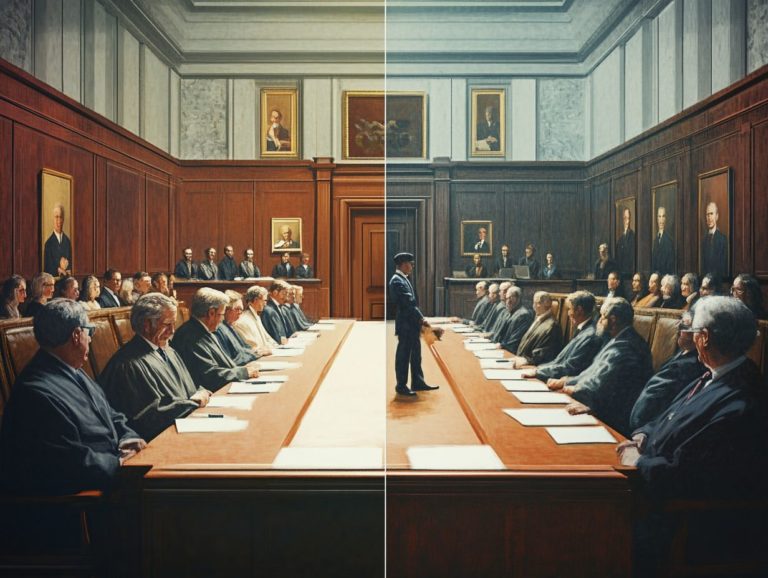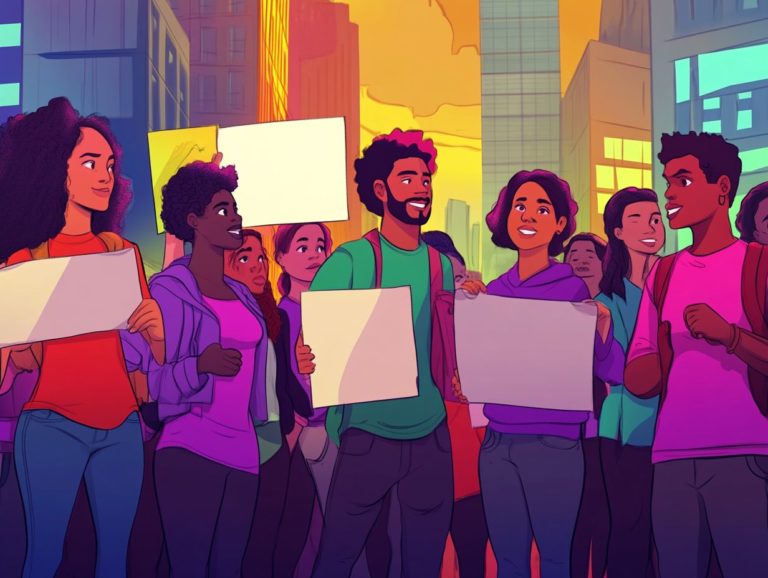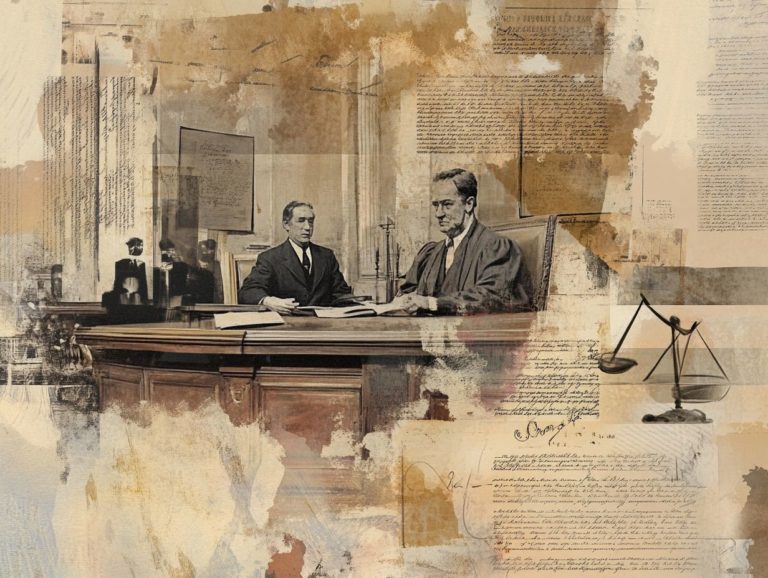The Right to Privacy: Implications for the Accused
In a time when personal information is effortlessly accessed and shared, the right to privacy stands as a fundamental pillar of individual freedom, especially within the legal system.
Let s dive into the exciting world of privacy rights, particularly for those accused of crimes.
From clarifying privacy rights to scrutinizing their legal implications, you will discover how these rights intersect with due process and the obstacles encountered in their protection.
Embark on this journey as you uncover the delicate balance between safeguarding personal privacy and ensuring justice in criminal cases.
Contents
- Key Takeaways:
- The Concept of Privacy
- Privacy in the Legal System
- Privacy Rights in Criminal Cases
- Balancing Privacy and Due Process
- Challenges to Privacy Rights for the Accused
- Defending Privacy Rights for the Accused
- Frequently Asked Questions
- What is the right to privacy and how does it relate to the accused?
- What are some examples of personal information that are protected by the right to privacy for the accused?
- Can the right to privacy be waived by the accused?
- Are there any exceptions to the right to privacy for the accused?
- What if the accused’s right to privacy is violated?
- How does the right to privacy for the accused affect the criminal justice system?
Key Takeaways:
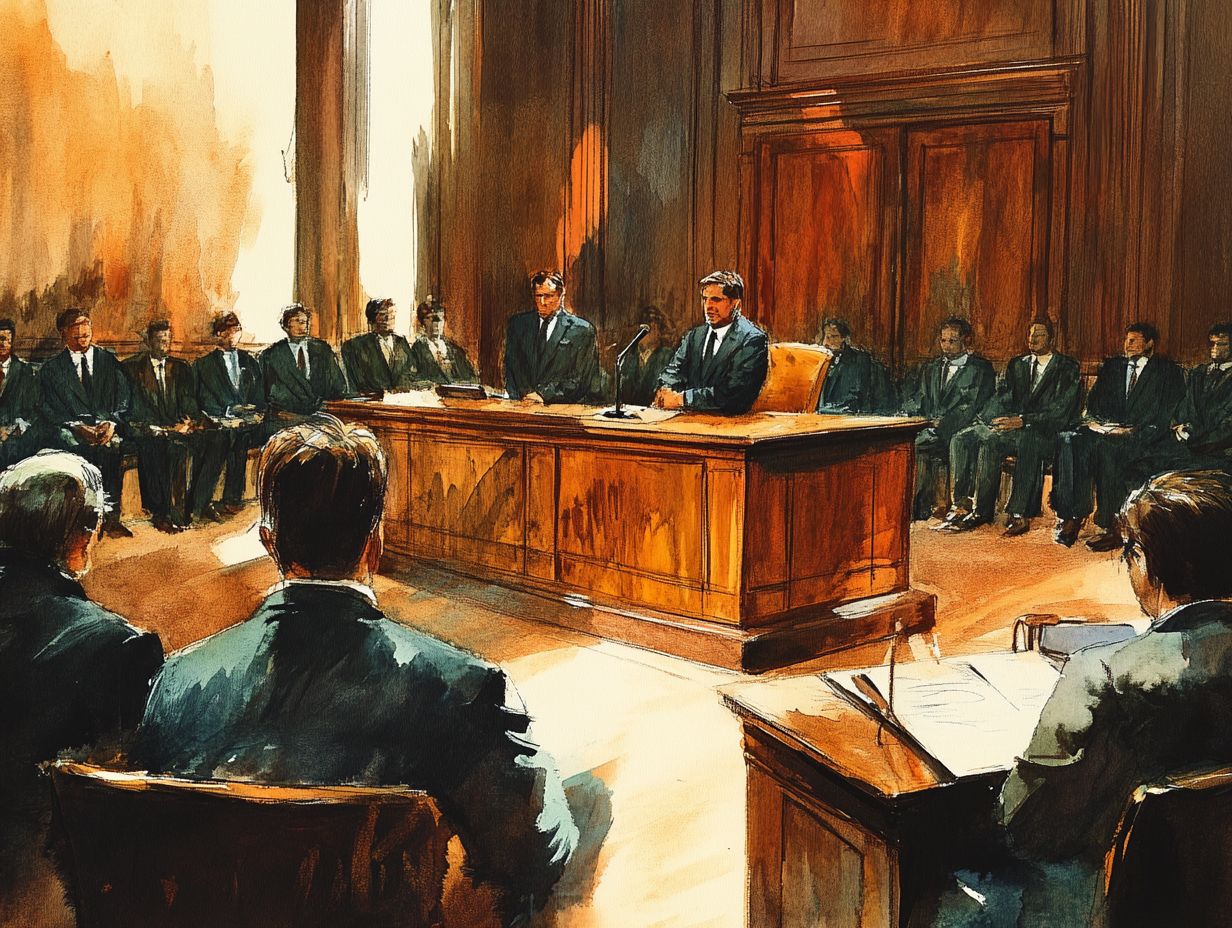
- The right to privacy is a fundamental human right protected by law.
- It upholds the dignity and autonomy of individuals accused of crimes.
- Privacy rights for the accused may face challenges in controversial cases, impacting trial outcomes.
- The intersection of privacy rights with other rights must be carefully balanced to ensure due process.
- Legal strategies and arguments are vital in defending privacy rights, including challenges to evidence obtained through invasive means.
The Concept of Privacy
The concept of privacy has undergone a remarkable evolution, emerging as a fundamental pillar of individual rights safeguarded by the U.S. Constitution.
Landmark decisions like Griswold v. Connecticut and Roe v. Wade vividly demonstrate how the Supreme Court has interpreted the right to privacy through the nuanced perspective of the Fourteenth Amendment and its penumbras.
Justice Harlan’s compelling arguments have illuminated the intricacies of personal autonomy, particularly in relation to family matters and sexual conduct, offering you a deeper understanding of these vital issues.
Defining the Right to Privacy
Defining the right to privacy requires delving into its constitutional roots, where individual rights and personal autonomy stand as the pillars of a democratic society. This fundamental principle shields you from unwarranted intrusion by the state and provides a sanctuary for your thoughts and communications.
As time marches on, various interpretations have surfaced, reflecting the complexities of modern life particularly in an age marked by rapid technological advancement. In governmental contexts, privacy involves safeguarding your personal data from monitoring by authorities and unwarranted searches.
On a personal level, it emphasizes your freedom to make choices without external interference. Constitutional provisions act as the backbone for these protections, ensuring that your rights are not just acknowledged but also enforceable. This fosters a societal framework where dignity and respect for individual autonomy can truly flourish.
Privacy in the Legal System
Privacy within the legal system is essential for safeguarding individual rights, especially in the contexts of criminal justice and court proceedings where privacy rights frequently hang in the balance.
The ongoing struggle between government monitoring and individual privacy protections remains a contentious topic, underscoring the significance of legal education in navigating these complex issues.
Impact on the Accused
The impact of privacy rights on the accused in the criminal justice system is undeniably profound. When violations occur, they can lead to significant invasions of privacy and undermine legal defenses.
The Fourth Amendment stands as a vital safeguard against unreasonable searches and seizures, emphasizing the importance of upholding privacy rights.
When law enforcement agencies overstep their bounds, it not only threatens individual freedoms but also risks compromising evidence that could be crucial for your defense.
Take, for example, the landmark case of Katz v. United States, where the Supreme Court affirmed that the right to privacy must be honored even in public spaces. This led to the exclusion of improperly obtained evidence, highlighting the delicate balance between public safety and the preservation of constitutional protections.
In another notable case, the defense hinged on proving that evidence obtained through warrantless surveillance should be considered inadmissible. This illustrates how privacy rights can significantly influence the course of criminal cases and shape the outcomes for those accused.
Privacy Rights in Criminal Cases
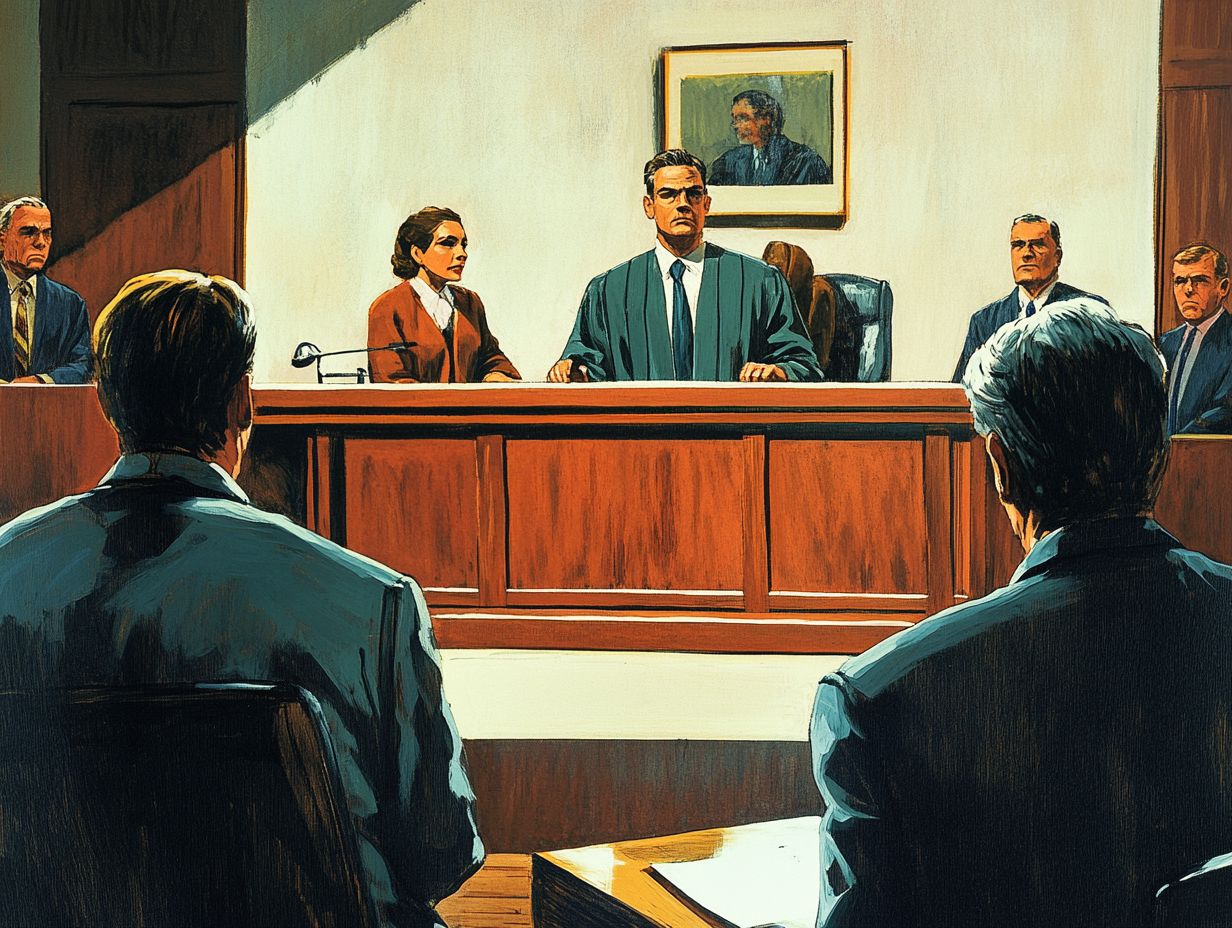
In criminal cases, your privacy rights guarantee fair treatment under the law. This is crucial for protecting against unlawful government data collection and other intrusive practices that may infringe on your personal freedoms.
Privacy Protections for the Accused
Privacy protections for the accused are firmly rooted in constitutional guarantees. They provide strong legal protections against violations of privacy during criminal proceedings.
These protections focus on key areas, particularly the Fourth Amendment s safeguards against unreasonable searches and seizures. This important constitutional provision requires law enforcement agencies to establish probable cause before obtaining search warrants, placing essential limits on their authority.
Landmark cases like Katz v. United States highlight the significance of reasonable expectations of privacy. They affirm that individuals have a right to confidentiality in their private conversations.
Privacy doctrines ensure fair legal treatment by emphasizing the necessity of due process. They also protect the integrity of the judicial system against invasive tactics that could prejudice the accused.
Balancing Privacy and Due Process
Navigating the balance between privacy and due process is challenging in legal practice.
It is essential to consider individual rights while also recognizing the need for effective law enforcement and judicial processes, especially regarding privacy expectations.
How the Right to Privacy Intersects with Other Rights
The right to privacy interacts with other fundamental rights, creating a crucial link that underscores the importance of individual rights and civil liberties in constitutional law.
This intersection is vital, as it informs various legal frameworks protecting essential freedoms, including free speech, the right to due process, and protection from unreasonable searches.
For instance, examining surveillance laws shows how the right to privacy directly influences free speech enforcement. Individuals may hesitate to voice dissent if they feel watched.
Similarly, landmark rulings like Roe v. Wade illustrate how privacy shapes the civil rights landscape and emphasizes personal autonomy.
These overlapping protections highlight the need to maintain a delicate balance not only to safeguard privacy but also to protect the broader spectrum of individual liberties that define a democratic society.
Challenges to Privacy Rights for the Accused
Challenges to privacy rights for the accused are increasingly apparent as government surveillance and privacy violations rise.
This trend raises urgent questions about whether legal education adequately addresses civil rights in this evolving landscape.
Controversial Cases and Precedents
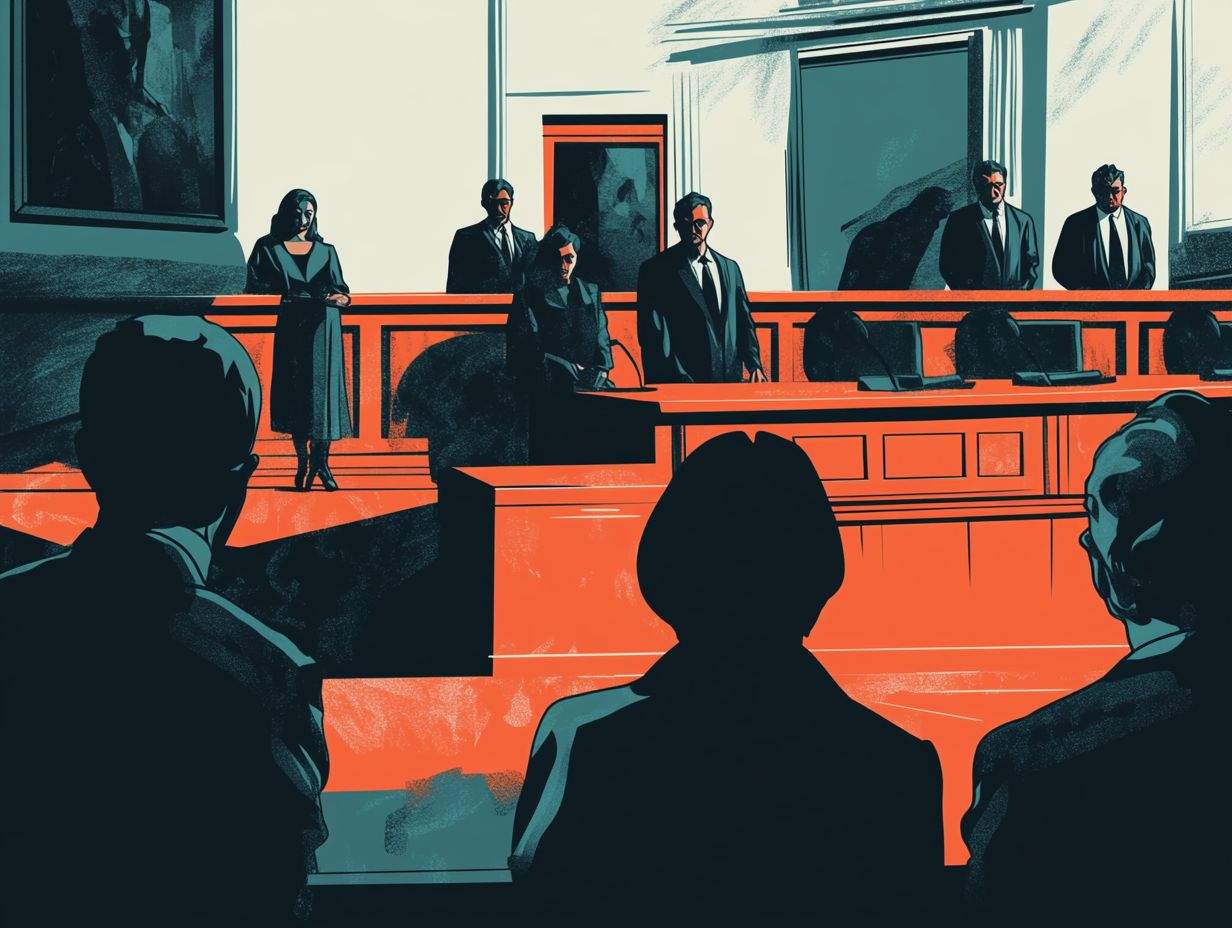
Controversial cases like Griswold v. Connecticut and Roe v. Wade, along with more recent rulings like Dobbs, have set vital precedents that shape our understanding of privacy rights within the legal framework. These landmark decisions spark intense debate and carry significant implications for individual freedoms, highlighting the balance between government interests and personal privacy.
For example, Griswold v. Connecticut established a constitutional right to privacy concerning contraceptive use. This marked a pivotal shift toward acknowledging personal autonomy in intimate matters.
Similarly, Roe v. Wade expanded these principles by affirming a woman’s right to choose, directly influencing subsequent cases and shaping societal norms.
In contrast, the Dobbs ruling has reignited discussions around reproductive rights, threatening decades of established legal precedent. This illustrates the evolving nature of privacy rights within the judicial system and highlights their broader societal implications.
Defending Privacy Rights for the Accused
Defending the privacy rights of the accused requires sophisticated legal strategies that navigate the intricate landscape of criminal justice. This is crucial when judicial decisions or governmental actions threaten essential privacy protections.
To learn more about your privacy rights or get involved in advocacy efforts, take action today!
Legal Strategies and Arguments
Legal strategies and arguments related to privacy rights often revolve around constitutional law, particularly concerning government data collection and potential infringements on these rights.
Courts regularly interpret the Fourth Amendment, which protects citizens from unfair searches and seizures. This provides a solid foundation for asserting individual privacy rights.
Landmark cases like Katz v. United States and Riley v. California changed the privacy game forever. These cases highlight how interpretations of privacy are evolving in the digital era, where the expectation of privacy now encompasses cell phones and electronic communications.
By focusing your legal defenses on establishing a reasonable expectation of privacy, you can effectively challenge unlawful government surveillance. This prompts courts to closely examine the methods used for data collection.
By leveraging established precedents and underscoring constitutional protections, you can craft persuasive arguments that defend privacy rights amid growing technological scrutiny.
Frequently Asked Questions
What is the right to privacy and how does it relate to the accused?
The right to privacy is a fundamental human right that protects individuals from unwanted intrusion by the government or other entities. It applies to everyone, including the accused in a criminal case. This includes understanding the rights of the accused, ensuring they have the right to keep certain personal information confidential during legal proceedings.
What are some examples of personal information that are protected by the right to privacy for the accused?
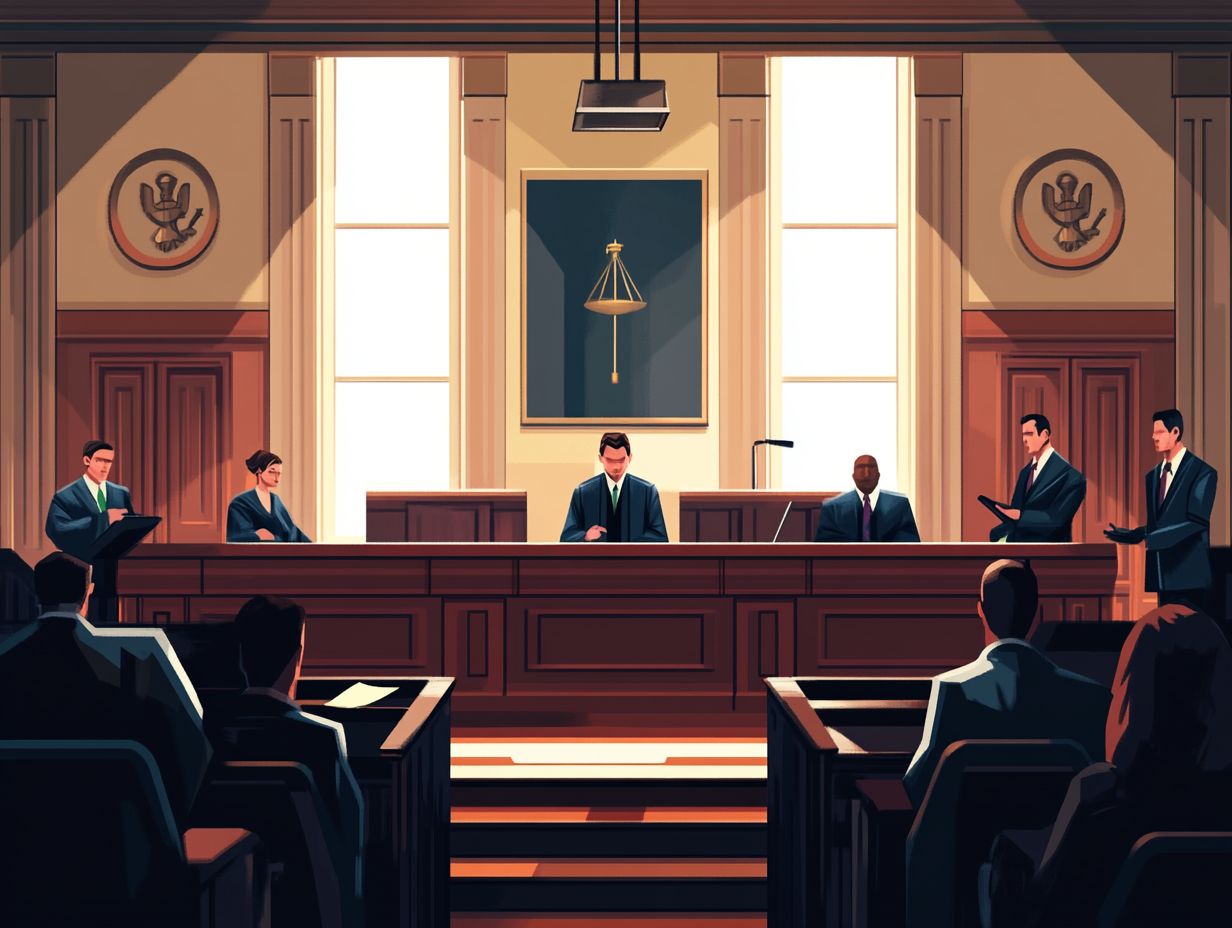
Protected personal information for the accused includes medical records, financial information, and communications with attorneys or therapists. The government cannot access or use this information without a valid legal reason.
Can the right to privacy be waived by the accused?
Yes, the right to privacy can be waived by the accused, but it must be done voluntarily and with full knowledge of the consequences. The accused may choose to disclose certain personal information for their defense, but they are not required to do so.
Are there any exceptions to the right to privacy for the accused?
Yes, certain exceptions exist. For example, if the accused poses a threat to public safety, the government may have the authority to access personal information. The accused’s right to privacy may also be limited when it conflicts with the rights of other individuals, such as victims or witnesses.
What if the accused’s right to privacy is violated?
If the accused’s right to privacy is violated, they may have grounds to challenge the admissibility of evidence gathered through the violation. They may also file a civil lawsuit against the government or entity responsible for the violation.
How does the right to privacy for the accused affect the criminal justice system?
The right to privacy for the accused ensures fair treatment and protection of their rights during legal proceedings. This principle highlights the role of ethics in rights of the accused and helps maintain the integrity of the criminal justice system by preventing the government from using unethical or illegal methods to gather evidence against the accused.
In conclusion, understanding the right to privacy is crucial for protecting the accused’s rights and ensuring a fair judicial process. As technology advances, ongoing discussions about these rights will remain vital for upholding justice.



